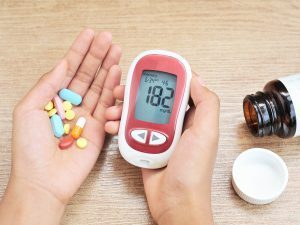- Home
- Editorial
- News
- Practice Guidelines
- Anesthesiology Guidelines
- Cancer Guidelines
- Cardiac Sciences Guidelines
- Critical Care Guidelines
- Dentistry Guidelines
- Dermatology Guidelines
- Diabetes and Endo Guidelines
- Diagnostics Guidelines
- ENT Guidelines
- Featured Practice Guidelines
- Gastroenterology Guidelines
- Geriatrics Guidelines
- Medicine Guidelines
- Nephrology Guidelines
- Neurosciences Guidelines
- Obs and Gynae Guidelines
- Ophthalmology Guidelines
- Orthopaedics Guidelines
- Paediatrics Guidelines
- Psychiatry Guidelines
- Pulmonology Guidelines
- Radiology Guidelines
- Surgery Guidelines
- Urology Guidelines
Repeated Antibiotic exposure may increase risk for type 2 diabetes

A retrospective cohort analysis of 14,361 US veterans published in the Primary Care Diabetes revealed that any and repeated exposure to certain antibiotics may increase the type 2 diabetes (T2D) risk among the veterans.
Mark D. Schwartz, Department of Population Health, NYU School of Medicine, New York, NY, U.S., and colleagues conducted the study to determine the impact of antibiotic exposure for risk of T2D.
The exposure to antibiotics may raise diabetes risk via microbiome perturbation and subsequent effect on inflammation, metabolic, and pancreatic functions.
The retrospective cohort study of 14,361 US veterans in primary care (2004-2014) without prior diabetes diagnosis was conducted, of whom 9.8% were diagnosed with diabetes in 3.4 years’ follow-up.
Also Read: Antibiotics may up Type 1 diabetes risk in children
The primary exposure was any antimicrobial prescribed >6 months prior to the date of T2D diagnosis, loss to follow-up, death, or the end of the study, measured as the number of courses of antimicrobial prescriptions filled and the mean daily dose (MDD). The primary outcome was an incident diagnosis of T2D through 2014, defined ≥2 ICD-9 codes for T2D or ≥2 prescriptions of T2D medications, other than metformin. Cox proportional hazards regression was used to model antimicrobial medications, demographic and anthropometric measures, and comorbid cardiovascular conditions to incident diabetes.
Key Findings:
- Increased risk of T2D was associated with >1 prescription (HR 1.13 [1.01–1.26]) compared to none.
- Time-varying analysis of the total number of cumulative courses prescribed showed increased T2D risk for cephalosporin (HR 1.17 [1.04–1.31]), macrolide (HR 1.08 [1.03–1.13]) and penicillin (HR 1.05 [1.02–1.07]).
- MDD showed increased risk per 100-unit (mg) increase in antibiotic exposure from (HR 1.05 [1.02–1.08]) for sulfonamide to (HR 1.70 [1.51–1.92]) for cephalosporin.
"Any and repeated exposure to certain antibiotics may increase T2D risk among Veterans. Results from this study add to the growing evidence suggesting that antibiotic exposure increases the risk for T2D Antibiotic stewardship may be enhanced by better understanding this risk and may lower the incidence of T2D in populations at risk," concluded the authors.
For further information log on to https://doi.org/10.1016/j.pcd.2018.07.001

Disclaimer: This site is primarily intended for healthcare professionals. Any content/information on this website does not replace the advice of medical and/or health professionals and should not be construed as medical/diagnostic advice/endorsement or prescription. Use of this site is subject to our terms of use, privacy policy, advertisement policy. © 2020 Minerva Medical Treatment Pvt Ltd